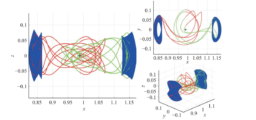Categorie: Comunicazioni Terra
Tags: frodi politica riscaldamento globale Scienza
Scritto da: Vincenzo Zappalà
Commenti:1
Il riscaldamento globale è solo la punta di un iceberg?
Poche parole per riportare due articoli che parlano non solo di GW, ma anche di come la Scienza potrebbe prendere una brutta piega (o forse l'ha già fatto). Tra la nullità dei nostri giornali, è sempre utile leggere qualcosa che ancora fa pensare e riflettere. Poi ognuno tragga le sue conclusioni. Non li traduco per non far pensare che aggiunga o tolga qualcosa di mio... Sono, comunque, a disposizione per eventuali chiarimenti
Scrivo per intero il secondo articolo, dato che la lettura è a pagamento...
http://www.washingtontimes.com/news/2016/mar/3/editorial-the-doctored-science-of-global-warming/
http://www.thetimes.co.uk/tto/opinion/columnists/article4705093.ece
According to a new study, scientists’ claims that coral reefs are doomed by ocean acidification are overplayed. An “inherent bias” in scientific journals, says the editor ofICES Journal of Marine Science, has excluded research showing marine creatures are not being damaged.
Instead, he says, many studies have used flawed methods by subjecting such creatures to sudden increases in carbon dioxide that would never happen in real life. No surprises there. The claim that CO2 emissions are acidifying the oceans is a favourite of climate-change alarmists.
Man-made global warming theory has been propped up by studies that many scientists have dismissed as methodologically flawed, ideologically bent or even fraudulent. The problem of scientific integrity, however, goes far wider. Psychology, neuroscience, physics and other scientific areas have been convulsed by revelations of dodgy research.
Richard Horton, editor-in-chief of The Lancet, has written bleakly: “The case against science is straightforward: much of the scientific literature, perhaps half, may simply be untrue.”
One reason is that cash-strapped universities, competing for money and talent, exert huge pressure on academics to publish more and more to meet the box-ticking criteria set by grant-funding bodies. Corners are being cut and mistakes being made.
But whatever happened to peer-review, the supposed kitemark of scientific integrity produced by the collective judgment of other researchers? Well, that seems to have gone south too. In 1998 Fiona Godlee, editor of the British Medical Journal, sent an article containing eight deliberate mistakes to more than 200 of the BMJ’s regular reviewers. Not one picked out all the mistakes. On average, they reported fewer than two; some did not spot any.
The problem lies with research itself. The cornerstone of scientific authority rests on the notion that replicating an experiment will produce the same result. If replication fails, the research is deemed flawed. But failure to replicate is widespread. In 2012, the OECD spent $59 billion on biomedical research, nearly double the 2000 figure. Yet an official at America’s National Institutes of Health has said researchers would find it hard to reproduce at least three-quarters of all published biomedical findings.
A 2005 study by John Ioannidis, an epidemiologist at Stanford University, said the majority of published research findings were probably false. At most, no more than about one in four findings from early-phase clinical trials would be true; epidemiological studies might have only a one in five chance of being true. “Empirical evidence on expert opinion”, he wrote, “shows that it is extremely unreliable”.
Underlying much of this disarray is surely the pressure to conform to an idea, whether political, commercial or ideological. Ideological fads produce financial and professional incentives to conform and punishment for dissent, whether loss of grant-funding or lack of advancement. As Professor Ioannidis observed: “For many current scientific fields, claimed research findings may often be simply accurate measures of the prevailing bias.” […]
Underlying this loss of scientific bearings is a closed intellectual circle. Scientists pose as secular priests. They alone, they claim, hold the keys to the universe. Those who aren’t scientists merely express uneducated opinion. The resulting absence of openness and transparency is proving the scientists’ undoing. In the words of Richard Horton, “science has taken a turn towards darkness”. But science defines modernity. It is our gold standard of truth and reason. This is the darkness of the West too.






1 commento
Pensavo che il mondo scientifico,considerato che tutti sono in qualche modo specialisti e dotti di base,fosse più rigoroso.L'entropia colpisce ancora!